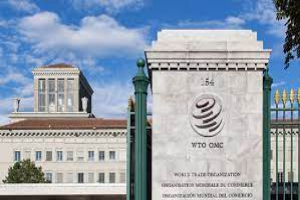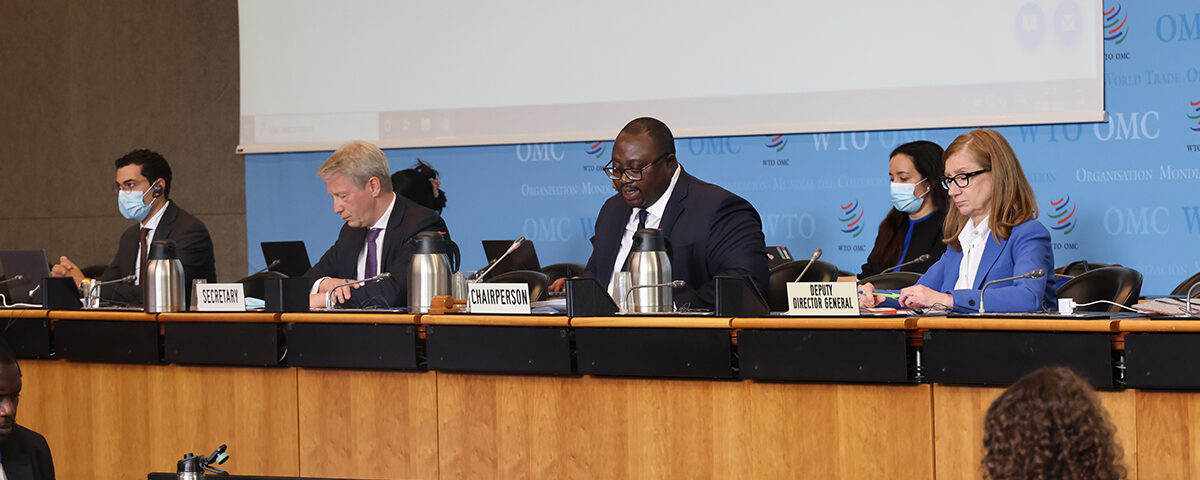
Geneva: At a meeting of the Council for Trade-Related Aspects of Intellectual Property Rights (TRIPS) today, World Trade Organization (WTO) members adopted an oral status report that incorporated a reference to the communication containing the outcome of the informal Quad discussions, which was circulated in the document for discussion in the TRIPS Council. It was adopted after WTO members discussed the outcome document that recently emerged from the informal process conducted with the Quad (the European Union, India, South Africa and the United States) for intellectual property (IP) response to COVID-19.
The oral status report will be submitted by the chair of the TRIPS Council, Ambassador Lansana Gberie of Sierra Leone, to the General Council scheduled for May 9-10, 2022. It provides a “factual overview” of discussions held at the TRIPS Council since October 2020. It contains both, the proposal by India and South Africa requesting a waiver from certain provisions of the TRIPS Agreement for the prevention, containment and treatment of COVID-19 and the proposal by the European Union for a draft General Council declaration on the TRIPS Agreement and Public Health in the circumstances of a pandemic.

The meeting today was the first opportunity for the whole membership to share their initial views on the text forwarded by WTO Director-General Ngozi Okonjo-Iweala and shared immediately by Ambassador Gberie with all delegations after an informal meeting of the TRIPS Council on May 3, 2022.
After an impasse of more than one year in the TRIPS Council, DG Okonjo-Iweala, working with Deputy Director-General Anabel González, supported an informal group of ministers’ efforts to come together around what could be a meaningful proposal, without prejudice to their respective positions, that could provide a platform to be built upon by the membership.
In their discussions, the Quad adopted a problem-solving approach aimed at identifying practical ways of clarifying, streamlining and simplifying how governments can override patent rights, under certain conditions, to enable diversification of production of COVID-19 vaccines.
At the meeting, delegations took the floor to welcome the proposal as a positive development and thanked DG Okonjo-Iweala and DDG González as well as the four members of the Quad for their efforts in trying to find a way forward in this process. The majority of delegations said they needed more time to review the document internally before they could engage in a substantive discussion. The chair said he will hold further consultations in different configurations after the General Council meeting on 9-10 May on how to structure substantive discussions going forward.
While acknowledging that the proposal sets a solid basis for further discussion and could lead to a long-awaited and urgently needed outcome, some delegations noted that further engagement is needed to assess specific issues that remain in brackets in the outcome document. These members mentioned the eligibility threshold for developing members who have exported more than 10 per cent of world vaccine doses in 2021 and the issuing of a single authorization for eligible members to use the subject matter of multiple patents necessary for the production or supply of a COVID-19 vaccine as elements of the proposal that would require further discussion.
Some members also noted that clear reference should be made to ensuring that a potential future arrangement shall apply without prejudice to existing flexibilities under the TRIPS Agreement. The chair encouraged delegations to prepare for the upcoming discussions with a constructive and pragmatic attitude, particularly given the few weeks remaining before the 12th Ministerial Conference (MC12), to be held in Geneva on 12-15 June. He also asked members to reflect upon the fact that they have come a long way in a process that started in October 2020 and that only now has produced a text around which serious discussions, consultations and even negotiations can be held.
“The fact that a number of active delegations with divergent views have invested months of hard work to come together around a text means that we may now have a realistic chance to promptly reach an agreed outcome on this long-standing and very urgent issue,” said Ambassador Gberie.
“It will not be easy, and it is in the nature of consensus that compromises are required on all sides and no one side will be entirely happy with the outcome. But an agreement by all members on a practical outcome on the role of IP in a pandemic will send a strong signal that despite all the differences, the WTO community can come together and highlight how the multilateral rules can help address this and future crises.”
– global bihari bureau





